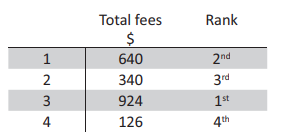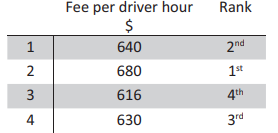February 2022
Jo Tuffill explains how you should apply limiting factor analysis to services.
Some people believe limiting factor analysis is only relevant for goods – not so.
Let’s take the current UK delivery driver shortage, currently a major limiting factor.
It turns up (or not) in unexpected places, as I found out the other day when my bus was cancelled. Let’s think of this from the bus company perspective.
BusWise has a driver shortage. Which routes should it allocate drivers to?
• Route 1 Swinford to Oxindon, a peak time service Bus holds 80 passengers, occupancy rate 80%, ticket price $10, journey time 1 hour.
• Route 2 Swinford to Oxindon, an off-peak service Bus holds 80 passengers, occupancy rate 50%, ticket price $8.50, journey time 0.5 hours.
• Route 3 Oxindon to Airport Coach holds 55 passengers, occupancy rate 70%, ticket price $24, journey time 1.5 hours.
• Route 4 Oxindon Electric City Hopper Bus holds 40 passengers, occupancy rate 90%, ticket price $3.50, journey time 0.2 hours.
Assume each service has the same running costs (other than driver time), and ends with the driver (and bus) back to the depot.
BusWise estimates the total fees for each of the four routes as passenger numbers x average occupancy rate x ticket price:

So route 3 is best? No – we need to apply limiting factor analysis based on hours of driver time.
So take the total fees per route and divide by the hourly journey time:

Route 3 drops from first place to last!
But for the other half of the marks we need to think a little deeper – or at least laterally. Think of the stakeholders for inspiration.
Are certain services more popular with drivers, and therefore more likely to retain those drivers?
Passengers may be more likely to give a driver a tip on the airport service, but drivers may dislike dealing with passenger luggage.
And what about reputational issues? Have they sold tickets in advance for the airport service?
Angry airline passengers who miss their flight could be a reputational problem. Cancelling the peak time bus could see commuters with pre-sold season tickets seeking compensation and leaving the service longer term – a far greater revenue impact. The electric city hopper could be ‘favoured’ by the local government for environmental reasons. They may even subsidise the route, or have environmental and air quality targets that hinge on it. So cancellation could cause ‘political’ issues. BusWise may also have environmental targets.
In the ACCA Performance Management exam, students are required to consider the scenario and discuss all possible factors, financial and non-financial.
• Jo Tuffill is the PM Tutor at FME Learn Online. Go to www.jotuffill.co.uk



